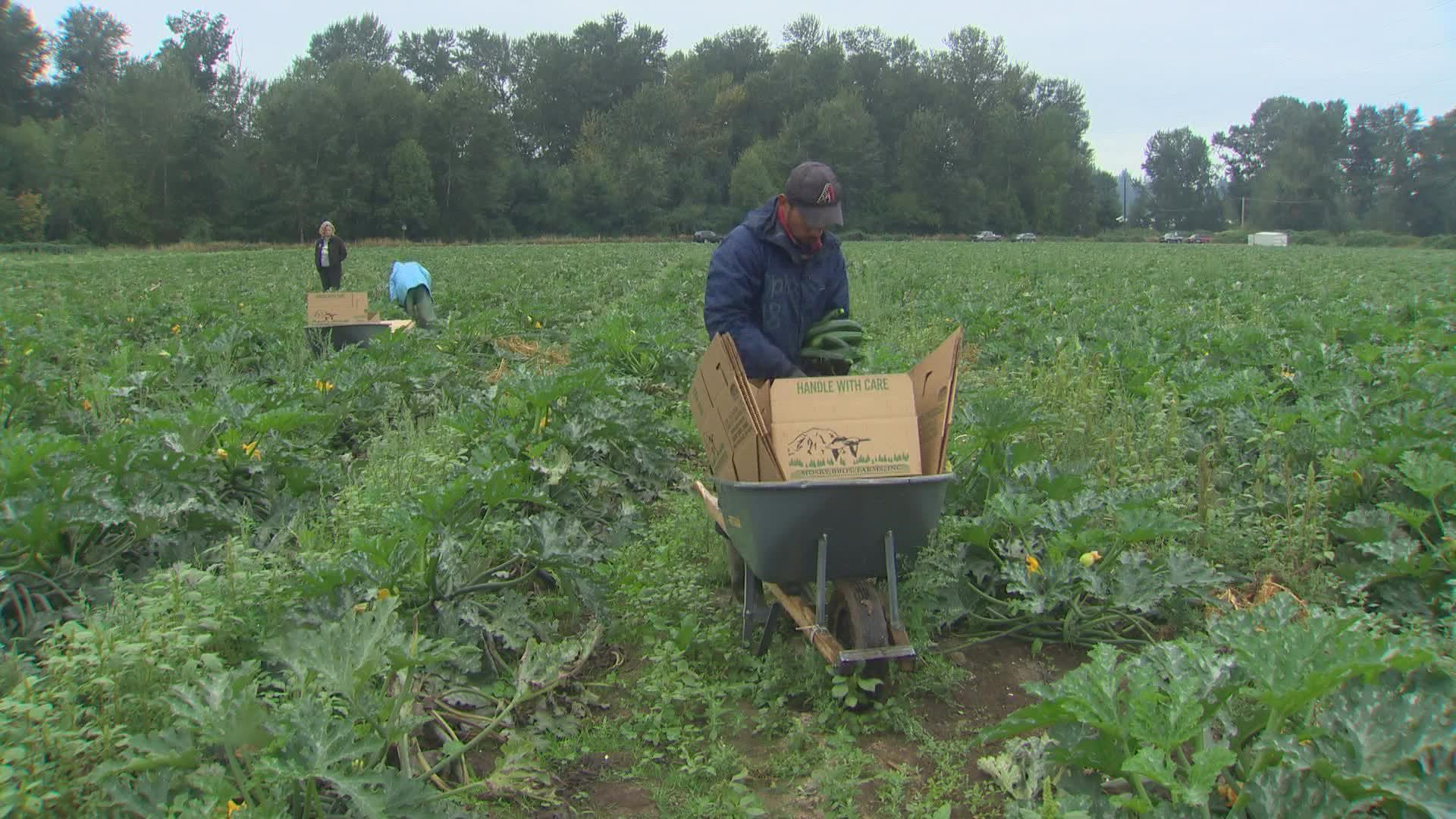SEATTLE — Farmworkers across Washington state will be eligible for overtime pay starting in January.
The new bill was signed into law by Gov. Jay Inslee and is one that President Joe Biden called a way to put “America’s farmer workers on equal footing” with the rest of the workforce.
Though, many critics say the issue is not as clear-cut as it sounds.
“It’s nice to know that you’re getting paid a little more now; you’re recognizing the work that people, that we do out there in the fields,” said a farmworker we’re calling “Mari,” who did not want to reveal her identity as she has many friends and relatives still working in agriculture.
The mother of five says the overtime pay is a small step forward for an industry that depends on manual labor.
“My husband fell off a ladder," Mari said. "I fell off two times pregnant with my kids when I was picking (apples)."
“I was pregnant but at that time nobody cared. We needed the money so we would just go and pick,” Mari continued.
Agriculture and dairy workers have historically been excluded from overtime pay regulations in Washington state. Recently state dairy workers sued their former employer and won in court – a legal victory that opened the way for the passage of Senate Bill 5172. Senate Bill 5172, signed into Washington state law in May, ensures overtime pay for agriculture workers starting in January.
Sen. Curtis King, R-Yakima, introduced the bill, voted for it, but now no longer supports it. He takes issue with a provision added down the line that could leave producers on the hook for years of back overtime pay. He feels the provision could be detrimental to the industry.
When asked if the senator supports overtime pay for agriculture, he responded that since he voted for the bill, “I have to say, 'Yes.'”
“I’m being as non-commital as I can be because the problem is both. It puts a real burden on (agriculture) and it puts real burden on the farmers it’s supposed to be helping,” King said.
“My fear is now with this overtime (legislation) and I believe and have been told by the (agriculture) community that they can’t afford to pay overtime and that they are going to cut them back to 40 hours a week.”
Farming isn’t like other industries as it’s the crops, not the managers, that dictate the work hours, at least that’s what the opposition argues.
“As much as it sounds nice to say, ‘It’s overtime’ – it’s not going to happen. You might get one or two hours and that’s it,” said Jose Salazar, a third-generation farmworker in Auburn, Wash.
Salazar says he’s opposed to the overtime legislation for fears it will cut down his hours and pay.
“I don’t think there is going to be a farmer in the state of Washington or anywhere that’s going to be capable of keeping the amount of hours and still pay overtime,” Salazar said.
We took this concern to the labor union championing the overtime fight.
“California already has some of these progressive policies in place. They are already rolling out and the sky did not fall," said Elizabeth Strater, who represents United Farm Workers. "The vast majority of the food we eat is from the United States."
Strater went on to call Washington state's new legislation historic.
“This is really, as much as anything, about being seen as an equal person, being seen as having, deserving the same equal rights as someone who works in a factory or in a hospital or in a school or in a steel mill,” Strater said.
Manuel Salazar, 87, came to the United States from Mexico and began working the fields in 1954. He says that as a young man he tried working in restaurants and factories but was always drawn back to the farms.
“I’ve worked in the fields all of my life,” Salazar said in Spanish. “We work for the nation. For the whole country. From here to Mexico, everyone eats what we cultivate.”
Rosella Mosby owns the farm where Salazar works. She says that margins in their industry are razor-thin as expenses continue to grow.
“You have a situation where we're already paying the highest wages in the country in Washington state for farm labor. We’re paying per hour what the average is per day in Mexico,” Mosby said.
“In my view, the legislature totally made a mistake on this bill because they didn’t think it all the way through,” she continued.
This story is anything but black and white – what we do know is no matter what lawmakers do these farmers will continue working the fields and food will ultimately end up in your grocery store.

